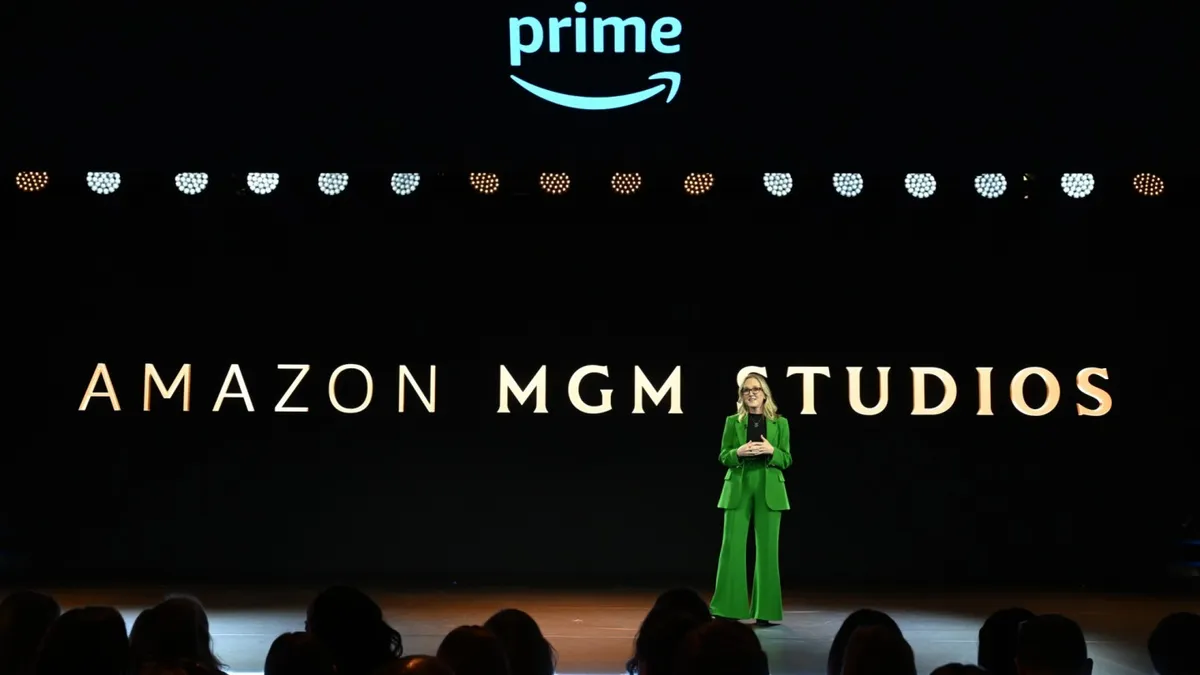
On May 14 of last year, Jennifer Salke, the chief of Amazon MGM Studios, took center stage at Pier 36 in New York City, aiming to impress advertisers with Amazon's ambitions in Hollywood. “Welcome to the next hundred years of Amazon MGM Studios,” Salke welcomed attendees in the expansive venue, which featured eye-catching displays, including cash guarded by security personnel for the promotion of Mr. Beast’s Beast Games and a Road House cabana bar. The event showcased a star-studded lineup, including notable names like Will Ferrell, Roger Federer, Jake Gyllenhaal, Alicia Keys, and Reese Witherspoon, emphasizing Amazon's commitment to the entertainment industry.
However, in a surprising turn of events, less than a year later, Mike Hopkins, the Amazon executive overseeing video efforts, announced that Salke was stepping down from her role, transitioning to a production deal. Although Amazon is relatively new to Hollywood, it has the potential to deliver a traditional parting gift for its executive team. On March 27, Hopkins reassured agents and talent that Salke’s unexpected exit was merely a strategic move to streamline Amazon's organizational structure. He expressed a desire for a conventional studio setup with a distinct film and television leader reporting directly to him, suggesting that Salke represented an unnecessary layer within the organization.
Despite Hopkins' reassurances, skepticism surrounded the narrative of Salke's departure. This change occurred as Amazon was actively planning its annual upfront event for advertisers, scheduled for May 12 at New York's Beacon Theater. The event promised a dazzling lineup of talent and updates from Amazon's expansive entertainment portfolio, including Prime Video, Fire TV Channels, Twitch, Wondery, IMDb, Amazon Live, and Amazon Music. Furthermore, the studio was preparing for its inaugural presentation for theater owners at CinemaCon in Las Vegas.
The scale of these initiatives highlights the evolving dynamics of the entertainment industry, increasingly influenced by technology giants. In recent years, traditional studio heads and network presidents were considered power brokers capable of shaping popular culture. However, during a town hall meeting, Amazon CEO Andy Jassy emphasized a need to empower employees who drive results rather than those who merely build larger teams. He stated, “The way to get ahead at Amazon is not to accumulate a giant team,” reinforcing a shift towards streamlined decision-making.
Following Salke's exit, Hopkins informed staff of a flatter leadership structure, opting not to fill the head of studios position. This approach aligns with Amazon's recent efforts to simplify reporting lines and accelerate decision-making. The new structure mirrors the operational model employed by Netflix, which has shifted away from a top-down hierarchy in favor of enabling executives lower in the organizational chart to greenlight projects independently.
Amazon's entertainment division operates as a component of a larger ecosystem, which includes Prime Video, sports, music apps, podcast networks, and livestream gaming platforms. In this context, the head of the studio assumed a middle management role, reporting to Hopkins, who ultimately answers to Jassy. Salke's background in television, including successful shows like This Is Us and Glee, was valuable for popular series such as Reacher and Jack Ryan, yet she faced challenges with high-concept projects.
The ambitious Lord of the Rings series, The Rings of Power, marked a significant success as Amazon’s biggest debut but struggled with long-term viewer retention. Salke championed the high-budget spy thriller Citadel, which faced numerous hurdles, including extensive reshoots and budget overruns, ultimately becoming one of the most expensive series ever produced. Despite these challenges, the series was renewed for a second season before its premiere in April 2023.
Industry insiders have noted Salke's difficulties, suggesting that her expertise in television did not entirely align with the broader responsibilities of leading a studio. The complex integration of Amazon’s corporate culture with MGM’s storied legacy proved daunting, especially after Amazon's acquisition of MGM for $8.5 billion in 2022. Sources indicate that Salke and Hopkins had a strained relationship, marked by power struggles that hindered collaboration.
Further complicating matters was the contentious relationship surrounding the James Bond franchise. Following the acquisition of MGM, producers Barbara Broccoli and Michael G. Wilson have not initiated any new Bond productions, with reports suggesting that Salke's management style contributed to this stagnation. Her absence from press releases related to the Bond franchise acquisition raised eyebrows, with industry professionals questioning her effectiveness in talent management.
As Amazon seeks to refine its leadership and direction, the studio has begun to take shape under the guidance of new executives like Courtenay Valenti and Vernon Sanders. Upcoming projects, including Road House and The Idea of You, have gained traction, alongside a promising calendar that features both commercial and prestigious titles. Valenti’s recent statements indicate that Amazon MGM plans to release 12 to 14 movies theatrically by 2026, pivoting towards a stronger focus on the theatrical market.
Ultimately, Salke's departure signifies a shift in Amazon's approach to entertainment, as the studio adapts to the evolving landscape of tech-driven media. With Valenti overseeing film production and Sanders managing television, the need for Salke's role has diminished, reflecting the changing dynamics of a tech-dominated entertainment industry. As Salke explored her next chapter, she acknowledged her commitment to laying the groundwork for future success at Amazon MGM Studios.